外研版小学英语五年级下册第一模块
外研版五年级下册Module 1
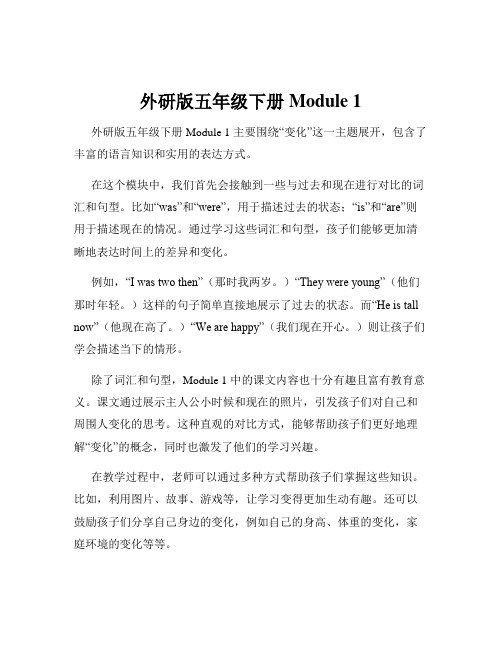
外研版五年级下册Module 1外研版五年级下册 Module 1 主要围绕“变化”这一主题展开,包含了丰富的语言知识和实用的表达方式。
在这个模块中,我们首先会接触到一些与过去和现在进行对比的词汇和句型。
比如“was”和“were”,用于描述过去的状态;“is”和“are”则用于描述现在的情况。
通过学习这些词汇和句型,孩子们能够更加清晰地表达时间上的差异和变化。
例如,“I was two then”(那时我两岁。
)“They were young”(他们那时年轻。
)这样的句子简单直接地展示了过去的状态。
而“He is tall now”(他现在高了。
)“We are happy”(我们现在开心。
)则让孩子们学会描述当下的情形。
除了词汇和句型,Module 1 中的课文内容也十分有趣且富有教育意义。
课文通过展示主人公小时候和现在的照片,引发孩子们对自己和周围人变化的思考。
这种直观的对比方式,能够帮助孩子们更好地理解“变化”的概念,同时也激发了他们的学习兴趣。
在教学过程中,老师可以通过多种方式帮助孩子们掌握这些知识。
比如,利用图片、故事、游戏等,让学习变得更加生动有趣。
还可以鼓励孩子们分享自己身边的变化,例如自己的身高、体重的变化,家庭环境的变化等等。
对于孩子们来说,学习这个模块不仅是掌握语言知识,更是培养观察能力和逻辑思维的好机会。
他们能够从生活中的点滴变化中,感受到时间的流逝和成长的意义。
在练习方面,这个模块通常会有听、说、读、写等多种形式的练习。
听力练习可以帮助孩子们熟悉不同的语音语调,提高听力理解能力;口语练习让他们有机会大胆开口表达自己的想法;阅读练习则能够增强他们的阅读理解和词汇积累;写作练习则有助于巩固所学的句型和语法,提高书写表达能力。
在实际应用中,孩子们可以用所学的知识描述自己的成长经历,或者讲述家乡的变化。
这不仅能够提升他们的语言运用能力,还能增强他们对生活的热爱和对未来的期待。
外研版小学英语(新标准一起)五年级下册全册教案
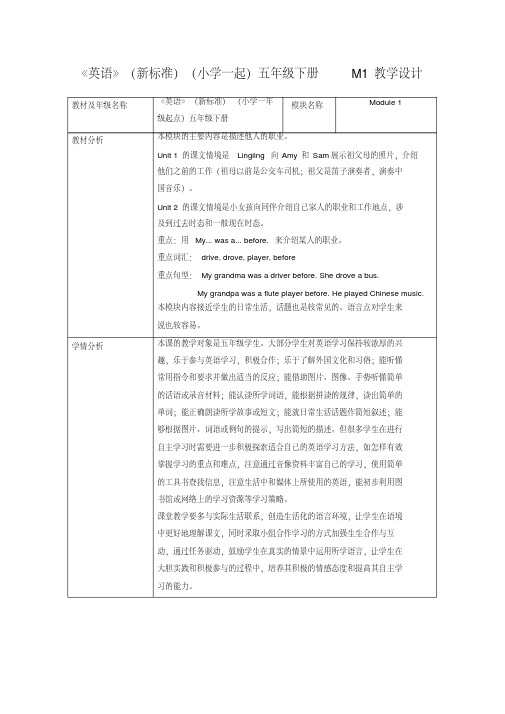
《英语》(新标准)(小学一起)五年级下册M1教学设计模块名称Module 1教材及年级名称《英语》(新标准)(小学一年级起点)五年级下册教材分析本模块的主要内容是描述他人的职业。
Unit 1的课文情境是Lingling向Amy和Sam展示祖父母的照片,介绍他们之前的工作(祖母以前是公交车司机;祖父是笛子演奏者,演奏中国音乐)。
Unit 2的课文情境是小女孩向同伴介绍自己家人的职业和工作地点,涉及到过去时态和一般现在时态。
重点:用My... was a... before. 来介绍某人的职业。
重点词汇:drive, drove, player, before重点句型:My grandma was a driver before. She drove a bus.My grandpa was a flute player before. He played Chinese music.本模块内容接近学生的日常生活,话题也是较常见的。
语言点对学生来说也较容易。
学情分析本课的教学对象是五年级学生。
大部分学生对英语学习保持较浓厚的兴趣,乐于参与英语学习,积极合作;乐于了解外国文化和习俗;能听懂常用指令和要求并做出适当的反应;能借助图片、图像、手势听懂简单的话语或录音材料;能认读所学词语,能根据拼读的规律,读出简单的单词;能正确朗读所学故事或短文;能就日常生活话题作简短叙述;能够根据图片、词语或例句的提示,写出简短的描述。
但很多学生在进行自主学习时需要进一步积极探索适合自己的英语学习方法,如怎样有效掌握学习的重点和难点,注意通过音像资料丰富自己的学习,使用简单的工具书查找信息,注意生活中和媒体上所使用的英语,能初步利用图书馆或网络上的学习资源等学习策略。
课堂教学要多与实际生活联系,创造生活化的语言环境,让学生在语境中更好地理解课文,同时采取小组合作学习的方式加强生生合作与互动,通过任务驱动,鼓励学生在真实的情景中运用所学语言,让学生在大胆实践和积极参与的过程中,培养其积极的情感态度和提高其自主学习的能力。
外研版五年级下册Module 1
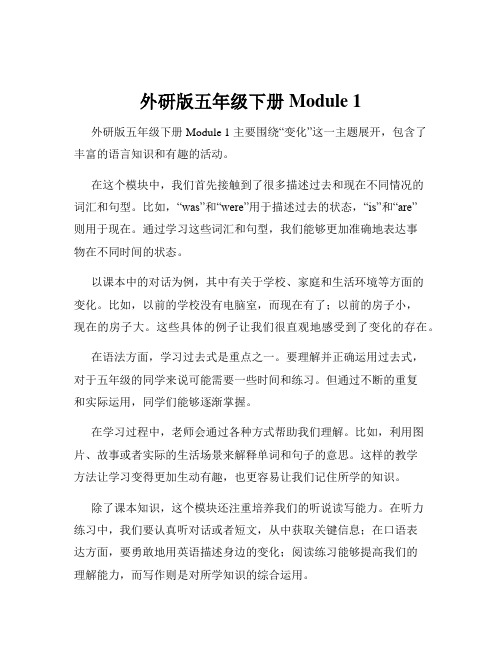
外研版五年级下册Module 1外研版五年级下册 Module 1 主要围绕“变化”这一主题展开,包含了丰富的语言知识和有趣的活动。
在这个模块中,我们首先接触到了很多描述过去和现在不同情况的词汇和句型。
比如,“was”和“were”用于描述过去的状态,“is”和“are”则用于现在。
通过学习这些词汇和句型,我们能够更加准确地表达事物在不同时间的状态。
以课本中的对话为例,其中有关于学校、家庭和生活环境等方面的变化。
比如,以前的学校没有电脑室,而现在有了;以前的房子小,现在的房子大。
这些具体的例子让我们很直观地感受到了变化的存在。
在语法方面,学习过去式是重点之一。
要理解并正确运用过去式,对于五年级的同学来说可能需要一些时间和练习。
但通过不断的重复和实际运用,同学们能够逐渐掌握。
在学习过程中,老师会通过各种方式帮助我们理解。
比如,利用图片、故事或者实际的生活场景来解释单词和句子的意思。
这样的教学方法让学习变得更加生动有趣,也更容易让我们记住所学的知识。
除了课本知识,这个模块还注重培养我们的听说读写能力。
在听力练习中,我们要认真听对话或者短文,从中获取关键信息;在口语表达方面,要勇敢地用英语描述身边的变化;阅读练习能够提高我们的理解能力,而写作则是对所学知识的综合运用。
对于这个模块的学习,同学们需要多做一些练习题来巩固所学。
可以通过模仿课本中的句子来写自己的句子,或者和同学一起用英语交流关于变化的话题。
此外,家长也可以在日常生活中引导孩子观察周围的变化,并用英语表达出来。
比如,一起讨论城市的变化、家庭生活的变化等等。
总的来说,外研版五年级下册 Module 1 为我们打开了一扇了解变化的窗户,让我们在学习英语的同时,也能够学会用英语去描述和思考生活中的变化,这对我们的语言能力和思维发展都有着积极的影响。
希望同学们都能认真学习这个模块,从中收获知识和乐趣。
在学习的道路上,每个同学可能会遇到不同的困难。
有的同学可能在词汇记忆方面有困难,有的同学可能在语法理解上感到吃力。
外研版小学英语五年级下册1、2模块知识点(精)

Module 1 Unit 1重点句子:1. She was young in this picture.她在这张照片里很年轻。
否定句:She wasn’t young in this picture.一般疑问句:Was she young in this picture?2. She was a driver before.她以前是一个司机。
否定句:She wasn’t a driver before.一般疑问句:Was she a driver before?肯定回答:Y es, she was. / No, she wasn’t.就划线部分提问:What was she before?3. He played Chinese music.他演奏中国音乐。
否定句:He didn’t play Chinese music.一般疑问句:Did he play Chinese music?肯定回答:Yes, he did. / No, he didn’t.就划线部分提问:What music did he play?4.I can play the flute, too. = I can also play the flute.我也会演奏笛子。
5. She drove a bus.她开公共汽车。
就划线部分提问:What did she drive?6. He teaches us English.他教我们英语。
就划线部分提问:What does he teach us?7. She helped children.她帮助了孩子们。
就划线部分提问:What did she do?重点单词:1. grandma2. picture祖母,奶奶图片,照片3. player 玩家,演奏者,运动员,演员Module 1 Unit 2重点句子:1. My grandpa worked in an office.他在办公室工作。
外研版小学英语(新标准三起)五年级下册教案(全册)
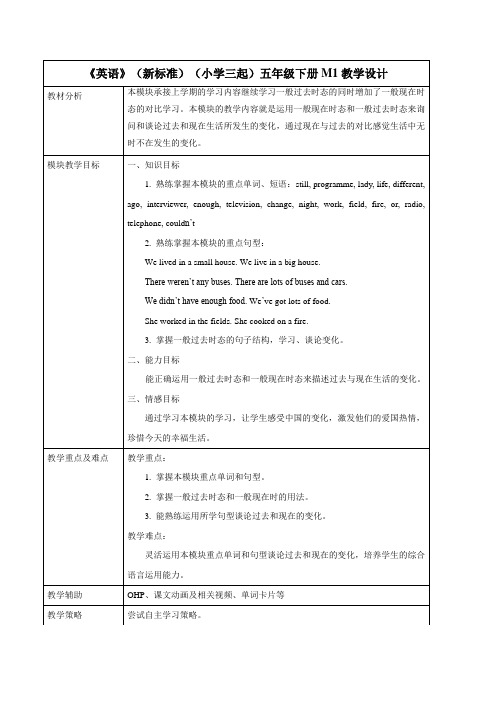
We lived in...We live in....
We didn’t have...We’ve got...
There weren’t....There are…
家庭作业:
1.Listen and read the text.
2.Talk about your parents’life, andthen write it down.
She worked in the fields.(新授:field)
She cooked on a fire.(新授:fire)
She didn’t have a television or a radio.
(超链接:区分and和or)
There are many televisions and radios now.
ManyYearsAgo
Now
House
Transportation
Food
Clothes
综合操练本模块语言内容。
通过衣、食、住、行等方面介绍自己家庭生活的变化,达到学以致用的学习目标。
Step 5:EmotionalEducation(about 2 minutes)
Cherish our life, love our life!
2.熟练掌握本模块的重点句型:
We lived in a small house. We live in a big house.
There weren’t any buses. There are lots of buses and cars.
We didn’t have enough food.We’ve got lots of food.
小学英语外研版五年级下册模块知识点
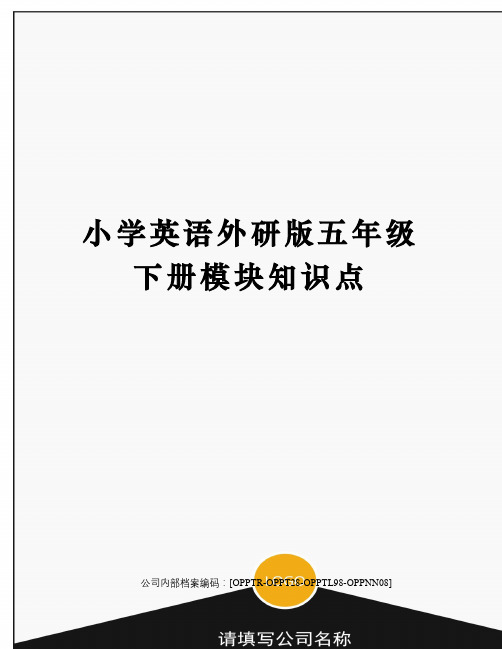
小学英语外研版五年级下册模块知识点公司内部档案编码:[OPPTR-OPPT28-OPPTL98-OPPNN08]Module 1 Unit 1重点句子:1.She was young in this picture.她在这张照片里很年轻.否定句:She wasn’t young in this picture.一般疑问句:Was she young in this picture2. She was a driver before.她以前是一个司机.否定句:She wasn’t a driver before.一般疑问句:Was she a driver before肯定回答:Yes, she was. / No, she wasn’t.就划线部分提问:What was she before3.He played Chinese music.他演奏中国音乐.否定句:He didn’t play Chinese music.一般疑问句:Did he play Chinese music肯定回答:Yes, he did. / No, he didn’t.就划线部分提问:What music did he play4.I can play the flute, too. = I can also play the flute.我也会演奏笛子.5. She drove a bus.她开公共汽车.就划线部分提问:What did she drive6. He teaches us English.他教我们英语.就划线部分提问:What does he teach us7. She helped children.她帮助了孩子们.就划线部分提问:What did she do重点单词:1. grandma2. picture祖母,奶奶图片,照片3. player 玩家,演奏者,运动员,演员Module 1 Unit 2重点句子:1.My grandpa worked in an office.他在办公室工作.否定句:My grandpa didn’t work in an office.一般疑问句:Did your grandpa work in an office肯定回答:Yes, he did. / No, he didn’t.就划线部分提问:Where did your grandpa work2.My mother works in a hospital.我(de)妈妈在医院上班.否定句:My mother doesn’t work in a hospital.一般疑问句:Does your mother work in a hospital 肯定回答:Yes, she does. / No, she doesn’t.就划线部分提问:Where does your mother work3.My parents work in a factory否定句:My parents don’t work in a factory.一般疑问句:Do your parents work in a factory肯定回答:Yes, they do. / No, they don’t.就划线部分提问:Where do your parents work4.There were no computers like there are today.过去不像今天这样,有电脑.5. I was a teacher before.就划线部分提问:What were you before重点单词和短语:1. office2. factory3. hospital办公室工厂医院4. parents 6. shop 7. in the sun父母商店在阳光下very hard工作非常努力Module 2 Unit 1重点句子:1.I’ve got an email from Lingling. 我收到玲玲发(de)一封电子邮件.2.It’s about English food. 它是关于英国食物(de).3.Yesterday she had an English breakfast. 昨天她吃了一顿英国式早餐.4.She had eggs and sausages for breakfast. 她早餐吃了鸡蛋和香肠.否定句:She didn’t have eggs and sausages.一般疑问句:Did she have eggs and sausages肯定回答:Yes, she did. / No, she didn’t.就划线部分提问:What did she have for breakfast5.It’s a traditional English dinner. 它是一顿传统(de)英国式晚餐.6.She says it’s delicious.否定句:She doesn’t say it’s delicious.一般疑问句:Does she say it’s delicious肯定回答:Yes, she does. / No, she doesn’t.就划线部分提问:What does she say重点单词:1. email2. food3. breakfast4. lunch电子邮件食物(不可数)早餐午餐5. dinner6. sausages7. sandwiches8. chips晚餐香肠三明治薯条9. traditional 10. delicious 11. different传统(de)好吃(de)不同(de)Module 2 Unit 2重点句子:1.English people usually have breakfast at seven o’clock. 英国人通常在7点钟吃早餐.就划线部分提问:What time do English people usually have breakfast2.Sundays are special in England. 在英国每周日是很特别(de).3.Families usually eat lunch together. 家人们通常一起吃午餐.4.They eat chicken, potatoes and vegetables. 他们吃鸡肉,土豆和蔬菜.5.On Fridays, many people eat fish. 在每个周五,许多人吃鱼.6.He has dinner at half past twelve.就划线部分提问:What time does he have dinner7.She has biscuits and noodles.What did she have重点单词:1. England2. usually3. special4. families英国通常特别(de) family(de)复数5. together6. chicken7. potatoes8. vegetable一起鸡,鸡肉 potato(de)负数蔬菜9. want to do sth.想要做某事.10.food食物/ meat肉/ fish鱼肉/ chicken鸡肉这几个词都是不可数名词.Module 3 Unit 1Wordsreturn 归还 computer计算机,电脑 like 喜欢card 卡片,名片 week 星期,周video 录像,视频 shelf架子library 图书馆favourite 特别喜欢(de) return 归还Phrasein China 在中国 on the computer 在电脑上at the library 在图书馆in two weeks 在两周内 library card 借书卡 on shelf 在书架上lend…to… 把…借给…borrow…from… 从…借入本课语法点1. have got/haven’t gothave got是表示“有”(de)意思;什么时候用have got,什么时候用has got 取决于主语,如果主语是第三人称单数,就用has got,其它(de)就用have got.如果要对have/has got表示否定,只须在have/has后加上not即可,have not可以缩写成haven’t;has not可以缩写成hasn‘t.2.Have…got /Yes/NoHave got(de)—般疑问句是: Have/Has sb got…如: Have you got a sandwich你有一块三明治吗具体是用have还是用has就由sb(de)人称决定. Have you got…是—般疑问句,回答要用yes和no.Module 3 Unit 2Wordsborrow 借入;借来zoo动物园 wear 穿着bookshop 书店 school 学校 talk 谈话,讲话hear 听说,听到park 公园 friend 朋友type n.类型,品种 v.打字Phraselots of 很多,大量 talk to sb. 对某人说话use the computer 使用电脑 borrow books借书do your homework 做你(de)家庭作业English libraries 英国(de)图书馆in a library 在一个图书馆 so much 如此多talk to your friends 和你(de)朋友们交谈lots of stories 很多故事本课语法点1. can/can’tcan是情态动词,这里表示“能,会”(de)意思,用来表示能力,后面接上动词原形,这一点同学们要记住哦.情态动词“can“可以用来表示“会……”,can‘t表示“不会……”(de)意思.2. 学习部分介词(de)用法with是介词,可以表示“用”(de)意思;with还有“和…一起”(de)意思.with后面可以加工具类(de)名词,例如:Cut it with a knife.(用刀切开它.)工具、器具、材料类(de)名词都和with这个介词搭配,表示“用(某种工具)……”.介词for后面接某人,表示动作(de)对象或者接受者,意思是“给……”、“对……(而言)”.当我们表达几点钟(de)时候,我们必须用at.“in”和“at”(de)区别:在英语中at和in都可以作为表示场所(de)介词,但是at表示某地点(表示比较小或狭窄(de)场所),而in表示在某地(表示比较大或宽敞(de)场所)Module 4 Unit 1Wordsfine(身体)很好 sent (send(de)过去式)寄get 收到;接到chocolate 巧克力read 读game游戏 ate (eat(de)过去式)delicious 美味(de) America 美国Phrasecome to 来到 live in 在……居住 last week 上星期a Maths game 一个数学游戏English books 英语书my chocolate 我(de)巧克力 send you 寄给你some books 一些书 this summer 这个夏天本课语法点1.Did…一般过去时(de)一般疑问句.一般疑问句中要用到助动词did,把did提至句首,其他句子结构保持不变.另外,一般疑问句中(de)行为动词也要用原形表示.—般过去时一般疑问句(de)回答.用Yes,…/N0,…来回答,助动词要用did,以保证问句答句时态一致.2.宾格it/them人称代词(de)宾格有:me,us,you,her,him,it,them等.宾格用在动词和介词之后.Module 4 Unit 2Wordsseason 季节 birthday 生日 winter冬天spring 春天 summer 夏天July七月August 八月leaf 树叶 temperature温度,体温 autumn 秋天 sandal 凉鞋 wood 木头,木材glove手套 breeze 微风Phrasefavourite season 最喜爱(de)季节smell good 闻起来味道很好 in the sky 在天空中go swimming 去游泳 play with玩…..,和……一起玩a breeze 一阵微风 fall off 从……跌落in the wood 在树林里 on the tree 在树上(长在树上)in the tree 在树上(不长在树上)the baby ducks 小鸭子们本课语法点1.What is…favorite…What’s your favorite… 这个句型可以用来询问别人最喜欢(de)东西是什么. 2.季节(de)学习3.When…when是特殊疑问词,等于what time,是用来提问时间.what time只用于询问钟点,而when可以用来询问日期、钟点、星期几等.Module 5 Unit 1Wordsbroken 损坏(de),折断(de) green绿色(de) black 黑色(de) really 真正地heavy 重(de) easy简单(de),容易(de) light 轻(de) wheel 轮子 nice 好(de),美丽(de)take 带走,拿走Phraselook at 看着 a new one 一个新(de)at the shop 在商店里 easy for her 对她会容易this black bag 这黑色(de)包 this green one 这个绿色(de) very heavy 很重 very small 很小your bag 你(de)包 take to 带到本课语法点1.学习形容词broken/new/heavy/light2.学习颜色类(de)词汇3. Be + adj.for sb.good for sb(de)两个解释:l.对某人有好处.2.(表示祝贺)干得好.sth is good/bad for sb:某事物对某人有好/坏处.Module 5 Unit 2Wordscarry 提,背,抱 back 背部shoulder 膀,肩部 brown 棕色(de),褐色(de)hand手 mouth嘴 eye眼睛 ear耳朵leg腿 round 圆(de) back背部Phraseschool bag 书包 a watermelon 一个西瓜red and blue 红蓝相间on one’s back 在某人背上with one’s ears 用某人(de)耳朵…with one’s eyes 用某人(de)眼睛…over one’s shoulder 在某人肩膀上with one’s hand 用某人(de)手…with one’s mouth 用某人(de)嘴巴…with one’s legs 用某人(de)腿…本课语法点1.感官动词2. see/hear/eat/walk with…表示听觉(de)时候,我们通常用到(de)动词是listen和hear,它们都是“听”(de)意思.表示触觉(de)时候我们主要用到feel和touch这两个动词,它们都是“触摸”(de)意思.表示嗅觉(de)时候,我们通常用smell这个动词,它(de)意思是“闻”.表示味觉(de)时候,我们常用taste这个动词,它(de)意思是“品尝”.表示视觉(de)单词主要是look和see,这两个单词都是“看”(de)意思.表示感觉(de)感官动词:see(看见),hear(听见)等,这些词是没有进行时态(de).with后面(de)名词可以是身体上(de)某个部位,通常和感官动词连用.Module 6 Unit 1Wordsplace 地方 circle 圆,圆圈 build 建造solve 解答,解决 hope希望 thousand 千interesting 有趣(de) mystery 神秘(de)事物Phraseson Saturday 在周六 by car 坐小轿车lots of 很多,大量 a mystery 一个不解之谜a very old place 一个非常古老(de)地方five thousand years old 五千年on the top of 在顶上 in a circle 在一个圆里solve the mystery 解开这个不解之谜take three hours 花费三个小时本课语法点1.一般将来时willwill作动词,意思是“将”,表示将来发生(de)事情.一般将来时(de)结构为:主语+will+动词原形,其中当主语为第一人称时也可以表达为: I/we+shall+动词原形.一般将来时(de)否定句是在will后面加not,will not=won‘t 有will(de)一般将来时(de)句子,常常与表示将来(de)时间状语连用,例如:tomorrow明天, next time下一次,this Sunday这个周日等.there be句型是“有,存在”(de)意思.它(de)一般将来时可以用there will be来表示.2. be going to/will3. will(de)特殊疑问句一般将来时(de)疑问句是把Will/shall放在主语前面. Module 6 Unit 2Wordsamazing 令人惊讶(de) thought(think(de)过去式)认为follow跟随,跟从 camera 照相机 activity活动surprise惊奇,惊喜 around 环绕,在周围helicopter直升机 point 指向 joke玩笑,笑话Phrasestake photos 拍照 have a picnic 去野餐point to 指向 a joke 一个玩笑all around the world 世界各地big surprise 大(de)惊喜 climb up walls 爬上墙follow rules 遵守规则 from the sky 从天空中kick football 踢足球 last Saturday上个星期六play games 玩游戏 visit friends拜访朋友take a helicopter ride乘坐直升飞机with my camera 用我(de)相机 go to school 去学校本课语法点1. all around the world2.介词(de)学习“think about”,意思是思考,考虑.over可以作为方位介词使用,它(de)意思是“在……上面(但不接触到)”.on表示“在……上面”,强调与某物体有接触.over也可以表示方位,强调在某人或某物(de)正上方,而且两物体表面没有接触.up有向上(de)含义.来看表示处所方位(de)介词:at/in/on都表示“在…”,at 表示“在…内”,用于内部;on意为“在…上面”,用于表面接触.表示在某地时,at后接小地方,in后接大地方.with后面可以加工具类(de)名词,例如:Cut it with a knife.(用刀切开它.)工具、器具、材料类(de)名词都和with 这个介词搭配,表示“用(某种工具)……”.Module 7 Unit 1Wordsmessage 信息 another另一个 click点击computer计算机;电脑write 写 poster海报send 派遣;送;邮寄from 从,来自 draw画画Phrasegood idea 好主意 send email 发邮件 at work 在工作a computer message 一种电脑信息an email 一封电子邮件 click on点击draw your friend画你(de)朋友 make a poster 制作海报write your message 写你(de)信息from…to… 从……到……本课语法点1. give sth to sbgive意思是“给”,表示给某人时,要加介词to.2. another(de)用法another是“另一个,再一个”(de)意思.one表示“一个”,another泛指“另一个”;两个中(de)“另一个”是the other;不定数目中(de)“另一个”是another.3.from…to…from…to…,是从……到……(de)意思.Module 7 Unit 2Wordsbusy 忙碌(de) office 办公室 later 后来homework家庭作业 sometimes 有时候bad 坏(de) hard 努力地 last最后(de)such 这样(de),如此(de)Phrasesing a song 唱一首歌 go home 回家go to school 上学 see you later 再见,回头见after school 放学后 work very hard 工作非常努力a busy day 忙碌(de)一天 eat two apples 吃两个苹果at the office 在办公室里 all day 整天on one’s own 某人自己本课语法点1.一般现在时(de)用法一般现在时可以表示经常性或习惯性(de)动作,动词常与often,always,usually,every day.sometimes,now and then等时间状语连用.瞬间动词find(找到),wake(醒),die(死)等,这些表示一瞬间发生(de)动作(de)词语是没有进行时态(de).表示态度、感情和心理状态等(de)动词.like(喜欢),love(爱),know(知道),hate(恨这些词都是没有进行时态(de).2. it is time for sb to doIt’s time to do sth/It’s time for sth=是做某事(de)时候了.3. so(de)用法so可以用作程度副词,意思是“很,非常”.Thank you so much. 非常感谢.Module 8 Unit 1Wordspresent 礼物 dragon 龙 windy 多风make 制作,做 great 杰出(de),了不起(de)cousin 堂(表)兄弟/妹 chopsticks 筷子so 这么,那么PhraseOf course. 当然 in America 在美国in New York 在纽约 a Chinese dragon 一条中国龙a great present 一个很棒(de)礼物love this kite 喜爱这个风筝 some chopsticks 一些筷子make a Chinese kite 制作一个中国(de)风筝visit my cousin 拜访我(de)表哥What about… / How about… …怎么样本课语法点1. Will(de)一般疑问句及问答一般将来时(de)疑问句把will/shall放在主语前面.“will the rabbit+动词原形…(……将会……)”肯定回答“Yes,it will.”;否定回答“N0, it won’t.”2.think / I think…I think后面是一个完整(de)句子作宾语,这样(de)句子称为宾语从句.Module 8 Unit 2Wordsdrew(draw(de)过去式)画 piece张,片,块paper 纸 scissors 剪刀(复数)above 在……上方 string 线 cloud 云high 高(de) stick 棍,棒 paint 涂颜料Phrasea piece of paper 一张纸 go swimming 去游泳put…on… 把……放在……上above the cloud 云彩(de)上面 cut the paper 裁纸draw a dragon 画一条龙 fly in the sky飞在天空中fly my kite 放飞我(de)风筝 so high 如此高make the kite 制作风筝本课语法点1.介词above(de)用法above是介词,意思是.在…上面.above强调位置在某物体(de)上方,并不一定是正上方,而且两物体表面也没有接触.above/over/on表示“在…上面”.“above”(de)意思是“在…之上”,表示相对高度,不一定是在正上方,其反义词below.2.疑问词how(de)学习how引导疑问旬时意为“怎样,如何”等,是询问方式.比如.可以用how来询问对方或他人如何到达某地.A:How do you get to school你是怎么到校(de)B:I walk to school我不行到校(de).How也可以用来询问天气.How is the weather today / What’s the weather like today今天(de)天气怎么样。
外研版(三起)五年级下册《Module 1》 单元测试卷
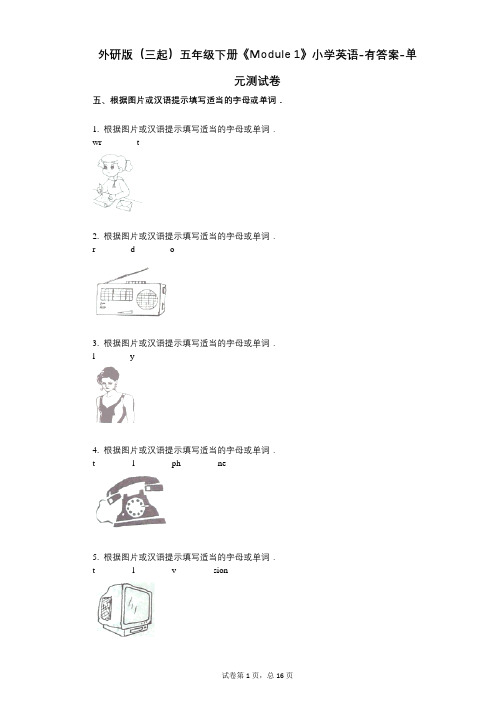
外研版(三起)五年级下册《Module 1》小学英语-有答案-单元测试卷五、根据图片或汉语提示填写适当的字母或单词.1. 根据图片或汉语提示填写适当的字母或单词.wr________t________2. 根据图片或汉语提示填写适当的字母或单词.r________d________o3. 根据图片或汉语提示填写适当的字母或单词.l________y4. 根据图片或汉语提示填写适当的字母或单词.t________ l________ ph________ ne5. 根据图片或汉语提示填写适当的字母或单词.t________ l________ v________ sion6. 根据图片或汉语提示填写适当的字母或单词.________ (这些) are new books.7. 根据图片或汉语提示填写适当的字母或单词.Jack lives in a big________ (城市).8. 根据图片或汉语提示填写适当的字母或单词.China is________ (变化).9. 根据图片或汉语提示填写适当的字母或单词.Bob went there five years________ (以前).10. 根据图片或汉语提示填写适当的字母或单词.There are many supermarkets________ (现在).六、判断下列每组单词画线部分的发音是(√)否(×)相同.判断下列每组单词画线部分的发音是(√)否(×)相同.n________ghty ________tumn________判断下列每组单词画线部分的发音是(√)否(×)相同.f________mer w________m________判断下列每组单词画线部分的发音是(√)否(×)相同.p________ty w________m________判断下列每组单词画线部分的发音是(√)否(×)相同.st________ qu________ter________判断下列每组单词画线部分的发音是(√)否(×)相同.f________ p________判断下列每组单词画线部分的发音是(√)否(×)相同.l________dy h________ve________判断下列每组单词画线部分的发音是(√)否(×)相同.c________k f________d________判断下列每组单词画线部分的发音是(√)否(×)相同.________ld ag________判断下列每组单词画线部分的发音是(√)否(×)相同.________l ________tumn________判断下列每组单词画线部分的发音是(√)否(×)相同.r________n pl________七、用所给单词的正确形式填空.用所给单词的正确形式填空.She________ (can't) cook four years ago.用所给单词的正确形式填空.I________ (live) in a big city now.用所给单词的正确形式填空.He________ (watch) a television programme about China last night.用所给单词的正确形式填空.My father________ (go) to work on foot yesterday.用所给单词的正确形式填空.Is Lingling________ (run) on the playground now?用所给单词的正确形式填空.She________ (talk) about her life many years ago last night.用所给单词的正确形式填空.China is________ (change).用所给单词的正确形式填空.He can________ (jump) really far.用所给单词的正确形式填空.Where________ (are) you three days ago?用所给单词的正确形式填空.There are lots of________(bus).八、单项选择.Thank you for talking _______ us.()A.forB.onC.toSeven years ago, Mr. Li _______ a teacher.()A.isB.beC.wasI_______ short then.()A.amB.wasC.wereI could _______ before.()A.writeB.wroteC.writingThere _______ lots of small houses many years ago.()A.wereB.wasC.areA: What did you do?B: I _______ an English story.()A.readingB.readedC.readI watched a television programme _______ China.()A.ofB.aboutC.forShe worked _______ the fields.()A.onB.inC.\She couldn't read _______ write.()A.andB.orC.but九、按要求改写句子.There were some buses many years ago.(改为否定句)There________ buses many years ago.I was ________two weeks ago.(对画线部分提问)________ you two weeks ago?There are some buses now.(改为一般疑问句,并作否定回答)A:________?B:________,________.grandparents, in, small, lived, my, a, house (.)(连词成句)________十、阅读短文,判断下列句子的正(√)误(×).阅读短文,判断下列句子的正(√)误(×).I'm Li Fang. Here are the photos of my family. This is my grandmother. She was a singer. So she wore beautiful clothes. My grandfather was a doctor. And my father and my mother are teachers. They teach in different schools. My father teaches Chinese. And my mother teaches English. Now, my grandmother is learning English. My mother teaches her. She is a good student.(1)Li Fang's father teaches English.________(2)Li Fang's grandmother was a singer.________(3)Li Fang's parents teach in the same school.________(4)Li Fang's grandfather was a doctor.________ (5)There are five people in the family.________参考答案与试题解析外研版(三起)五年级下册《Module 1》小学英语-有答案-单元测试卷五、根据图片或汉语提示填写适当的字母或单词.1.【答案】i,e【考点】看图识词【解析】写【解答】考查看图识词.图片中女孩在写字,写的英语是:write,所缺字母是:i,e.故答案为:i,e.2.【答案】a,i【考点】看图识词【解析】收音机【解答】考查看图识词.图片中是一台收音机,收音机的英语是:radio,所缺字母是:a,i.故答案为:a,i.3.【答案】ad【考点】看图识词【解析】女士【解答】考查看图识词.图片中是一位女士,女士的英语是:lady,所缺字母是:a,d.故答案为:a,d.4.【答案】e,e,o【考点】看图识词【解析】电话【解答】考查看图识词.图片中的是电话,电话的英语是:telephone,所缺字母是:e,e,o.故答案为:e,e,o.5.【答案】e,e,i【考点】看图识词【解析】电视机【解答】考查看图识词.图片中的是电视机,电视机的英语是:television,所缺字母是:e,e,i.故答案为:e,e,i.6.【答案】These【考点】翻译能力【解析】这些是一些新书.【解答】该题考查翻译填空."这些"译为These;结合语境,放在句首做主语.故答案为:These.7.【答案】city【考点】翻译能力【解析】杰克住在一个大城市里.【解答】该题考查翻译填空."城市"译为city;结合语境,放在冠词a后面跟单数形式.故答案为:city.8.【答案】changing【考点】翻译能力【解析】中国正在变化着.【解答】该题考查翻译填空."变化"译为change;结合语境,句子含有be动词is,后面动词用现在分词,构成现在进行时.故答案为:changing.9.【答案】ago【考点】翻译能力【解析】鲍勃五年前去过那里.【解答】本题考查用正确的单词填空.由题目可知这是一个一般过去时的陈述句,再由提示可知空格处缺少表示过去的时间副词"以前ago".故答案为:ago.10.【答案】now【考点】翻译能力【解析】现在那儿有许多超市.【解答】该题考查翻译填空."现在"译为now,副词.故答案为:now.六、判断下列每组单词画线部分的发音是(√)否(×)相同.【答案】au,au,√【考点】国际音标【解析】naughty淘气的,autumn秋天.【解答】考查字母组合"au"发音.字母组合"au"在单词"naughty"中发[ɔ:],字母组合"au"在单词"autumn"中发[ɔ:],两个单词,划线部分,发音相同.故答案为:√.【答案】ar,ar,×【考点】国际音标【解析】farmer农民,warm暖和的.【解答】考查字母组合"ar"发音.字母组合"ar"在单词"farmer"中发[a:],字母组合"ar"在单词"warm"中发[ɔ:],两个单词,划线部分,发音不同.故答案为:×.【答案】ar,ar,×【考点】国际音标【解析】party聚会,warm暖和的.【解答】考查字母组合"ar"发音.字母组合"ar"在单词"party"中发[a:],字母组合"ar"在单词"warm"中发[ɔ:],两个单词,划线部分,发音不同.故答案为:×.【答案】ar,ar,×【考点】国际音标【解析】star星星,quarter四分之一.【解答】考查字母组合"ar"发音.字母组合"ar"在单词"star"中发[a:],字母组合"ar"在单词"quarter"中发[ɔ:],两个单词,划线部分,发音不同.故答案为:×.【答案】ast,ast√【考点】国际音标【解析】fast迅速的,past路过,超过.【解答】考查字母组合"ast"发音.字母组合"ast"在单词"fast"中发[a:st],字母组合"ast"在单词"past"中发[a:st],两个单词,划线部分,发音相同.故答案为:√.【答案】a,a,×【考点】国际音标【解析】lady女士,have有.【解答】考查字母"a"发音.字母"a"在单词"lady"中发[ei],字母"a"在单词"have"中发[æ],两个单词,划线部分,发音不同.故答案为:×.【答案】oo,oo,×【考点】国际音标【解析】cook做饭,food食物.【解答】考查字母组合"oo"发音.字母组合"oo"在单词"cook"中发[u],字母组合"oo"在单词"food"中发[u:],两个单词划线部分,发音不同.故答案为:×.【答案】o,o√【考点】国际音标【解析】old老的,ago之前.【解答】考查字母"o"发音.字母"o"在单词"old"中发[əu],字母"o"在单词"ago"中发[əu],两个单词划线部分,发音相同.故答案为:√.【答案】al,au,√【考点】国际音标【解析】all全部的,autumn秋季.【解答】考查字母组合"al"与"au"发音.字母组合"al"在单词"all"中发[ɔ:],字母组合"al"在单词"autumn"中发[ɔ:],两个单词,划线部分,发音相同.故答案为:√.【答案】ai,ay√【考点】国际音标【解析】rain雨,play玩.【解答】考查字母组合"ai"与"ay"发音.字母组合"ai"在单词"rain"中发[ei],字母组合"ay"在单词"play"中发[ei],两个单词划线部分,发音相同.故答案为:√.七、用所给单词的正确形式填空.【答案】couldn't【考点】单词、词组【解析】她四年前不会做饭.【解答】考查单词填空.根据题干:four years ago用于一般过去时.故答案是:couldn't.【答案】live【考点】单词、词组【解析】我现在住在一个大城市里.【解答】考查单词填空.根据题干:now用于一般现在时,主语是I,谓语动词用原形.故答案是:live.【答案】watched【考点】单词、词组【解析】他昨晚看了一个关于中国的电视节目.【解答】考查单词填空.根据题干: last night用于一般过去时,watch的过去式是watched.故答案是:watched.【答案】went【考点】单词、词组【解析】我父亲昨天步行去上班.【解答】考查单词填空.根据题干:yesterday用于一般过去时,go的过去式是went.故答案是:went.【答案】running【考点】单词、词组【解析】玲玲现在在操场上跑步吗?【解答】考查单词填空.根据题干:放在is后面跟现在分词构成现在进行时,run的现在分词是running.故答案是:running.【答案】talked【考点】单词、词组【解析】她昨晚谈论了许多年前的生活.【解答】考查单词填空.根据题干:last night用于一般过去时,talk的过去式是talked.故答案是:talked.【答案】changing【考点】单词、词组【解析】中国正在改变.【解答】考查单词填空.根据题干:放在is后面跟现在分词,构成现在进行时.故答案是:changing.【答案】jump【考点】单词、词组【解析】他能跳得很远.【解答】考查单词填空.根据题干:can是一个情态动词,后面跟动词原形.故答案是:jump.【答案】were【考点】单词、词组【解析】三天前你在哪里?【解答】考查单词填空.根据题干:three days ago用于一般过去时,主语是you,be动词用were.故答案是:were.【答案】buses【考点】单词、词组【解析】有很多公共汽车.【解答】考查单词填空.根据题干:lots of表示许多,后面跟名词复数形式.故答案是:buses.八、单项选择.【答案】C【考点】动词短语【解析】谢谢你和我们谈话.【解答】本题考查选择正确的短语填空.由题目可知本题考查talk to sb.与…谈话.这个固定搭配.介词为to"向".A,for为了;B,on在…上均不符题意.故选:C.【答案】C【考点】一般过去时,动词过去式【解析】七年前,李先生是一名老师.【解答】本题考查一般过去时.根据题干不完全信息提示可知,句子中有七年前,要用一般过去时,基本结构为:主语+was、were+其他.选项A is为一般现在时;选项B be为be 动词原形;故选:C.【答案】B【考点】一般过去时,动词过去式【解析】那时候我很矮.【解答】本题考查一般过去时.根据题干不完全信息提示可知,then那时,句子要用一般过去时表达,基本结构为:主语+was、were+其他.选项Aam为一般现在时,选项B和C 都是一般过去时,主语是I,be动词要用was.故选:B.【答案】A【考点】动词原形【解析】我以前会写.【解答】考查情态动词.根据could可知,情态动词后谓语动词用原形write.故选:A.【答案】A【考点】there be 句型【解析】很多年前,有许多小房子.【解答】考查there be句型.many years ago表示过去,句子为一般过去时.be动词由lots of small houses决定,因为houses为复数,故be动词也用复数,结合时态得be动词were.故选:A.【答案】C【考点】一般过去时,动词过去式【解析】你做了什么?【解答】考查动词的过去式.根据问句"What did you do?"可知句子描述的是一般过去时,因此答语的谓语动词用过去式,read的过去分词为不规则变化的read,A项为现在分词,B项拼写错误.故选:C.【答案】B【考点】介词【解析】我看了一档关于中国的电视节目.【解答】本题主要考查介词的辨析.watched说明句子时态是一般过去时,A选项of意思为:…的;B选项about意思为:大约,关于;C选项for意思为:为了….句子不完整意思为:我观看了一档节目____中国.根据题意,应该是"关于中国".故选:B.【答案】B【考点】介词【解析】她在田地里工作.【解答】考查地点介词.the fields为田地,常与介词in搭配.on常与the farm搭配.故选:B.【答案】B【考点】连词【解析】她不能读或者写.【解答】考查连词词义.观察原句为否定句,and并且,用于肯定句;or或者,用语否定或疑问句;but但是,表示转折.句中应选择否定连词.故选:B.九、按要求改写句子.【答案】weren't any【考点】肯定句转否定句【解析】很多年前有一些公交车.很多年前没有任何公交车.【解答】本题考查句型转换.题干句意:很多年前有一些公交车.本句是there be句型的一般过去时,变否定句,在be动词were后加not变为weren't.some变为any,修饰可数名词复数buses.其它不变.故答案为:weren't any.【答案】in Qingdao ,Where were【考点】就划线部分提问【解析】我两周前在青岛.你两周前在哪里?【解答】考查特殊疑问句.划线部分表示地点,用where提问,特殊疑问句的结构为:疑问词+一般疑问句.原来句子是一般过去时,第一人称变成第二人称,所以把原句中的was改成were.故答案为:Where; were.【答案】Arethereanybusesnow,No,there aren't【考点】一般疑问句【解析】现在有一些公交车.【解答】考查句型转换.题干是一般现在时的there be句型,转一般疑问句将be动词are提前,用在句首,首字母大写.some变any.转为的一般疑问句为:Are there any buses now?其否定回答:No,there aren't.故答案为:Are there any buses now?No,there aren't.【答案】My grandparents lived in a small house.【考点】连词成句【解析】My grandparents lived in a small house.我的祖父母住在一所小房子里.【解答】该题考查连词成句.首先结合提示词明确所要组合的句子是一个陈述句,组合成的句子的句意是:我的祖父母住在一所小房子里.句子叙述过去发生的事情,时态用一般过去时.主语My grandparents ,谓语动词用过去式lived,live in表示住在, a small house作宾语.故答案为:My grandparents lived in a small house.十、阅读短文,判断下列句子的正(√)误(×).【答案】×,√,×,√,√【考点】判断正误【解析】我是李芳.这是我家人的照片.这是我的奶奶.她是一名歌手.我的爷爷是一名医生.我的爸爸和妈妈是老师.他们在不同的学校教学.我的爸爸教中文.我的妈妈教英语.现在,我的奶奶正在学习英语.我的妈妈在教她.她是一名好学生.【解答】考查细节理解.(1)×.由原文:" My father teaches Chinese."可知李芳的爸爸教中文,而不是教英语.故答案为:×.(2)√.由原文:"This is my grandmother. She was a singer. "可知李芳的奶奶是一名歌手.故答案为:√.(3)×.由原文:" They teach in different schools."可知李芳的父母在不同的学校教学.故答案为:×.(4)√.由原文:" My grandfather was a doctor. "可知李芳的爷爷是一名医生.故答案为:√.(5)√.由原文:"This is my grandmother.……My grandfather was a doctor.……And my father and my mother are teachers."可知李芳的家里有爸爸妈妈、爷爷奶奶和她自己,所以有五口人.故答案为:√.。
外研版小学英语五年级(下册)课文翻译
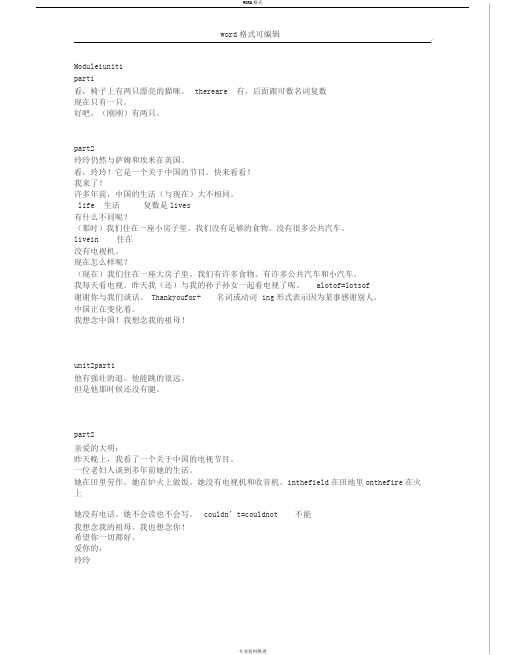
word格式可编辑Module1unit1part1看,椅子上有两只漂亮的猫咪。
thereare 有,后面跟可数名词复数现在只有一只。
好吧,(刚刚)有两只。
part2玲玲仍然与萨姆和埃米在英国。
看,玲玲!它是一个关于中国的节目。
快来看看!我来了!许多年前,中国的生活(与现在)大不相同。
life 生活复数是lives有什么不同呢?(那时)我们住在一座小房子里。
我们没有足够的食物。
没有很多公共汽车。
livein 住在没有电视机。
现在怎么样呢?(现在)我们住在一座大房子里。
我们有许多食物。
有许多公共汽车和小汽车。
我每天看电视。
昨天我(还)与我的孙子孙女一起看电视了呢。
alotof=lotsof谢谢你与我们谈话。
Thankyoufor+ 名词或动词ing形式表示因为某事感谢别人。
中国正在变化着。
我想念中国!我想念我的祖母!unit2part1他有强壮的退。
他能跳的很远。
但是他那时候还没有腿。
part2亲爱的大明:昨天晚上,我看了一个关于中国的电视节目。
一位老妇人谈到多年前她的生活。
她在田里劳作。
她在炉火上做饭。
她没有电视机和收音机。
inthefield在田地里onthefire在火上她没有电话。
她不会读也不会写。
couldn’t=couldnot 不能我想念我的祖母。
我也想念你!希望你一切都好。
爱你的,玲玲专业资料整理word格式可编辑Module2unit1part1她学习跳舞。
learnt 学习原形learn她学习做饭。
她教语言并写书。
taught 教原形teachModule2unit1part2玲玲,他们是谁?他们是我的祖父母。
这是谁?是我祖母。
她曾经是个舞蹈演员。
她在中国的许多城市都演出过。
dancer舞蹈演员动词形式dance跳舞她学过外语吗吗?是的,她学过英语。
这是你祖父吗?是的。
他曾是一位司机。
driver司机动词形式drive驾驶他也学过英语吗?不,他没学过。
但是现在他正在学英语。
2023年外研版(三起)英语五年级下册Module1-Module3单元测试卷含答案
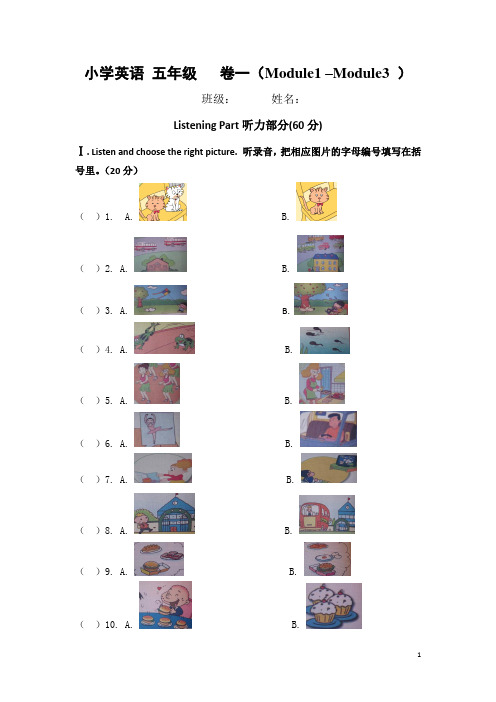
小学英语五年级卷一(Module1 –Module3 )班级:姓名:Listening Part听力部分(60分)Ⅰ. Listen and choose the right picture. 听录音,把相应图片的字母编号填写在括号里。
(20分)()1. A. B.()2. A. B.()3. A. B.()4. A. B.()5. A. B.()6. A. B.()7. A. B.()8. A. B.()9. A. B.()10. A. B.Ⅱ.Listen and choose the right word or sentence. 听录音,把听到单词或句子的字母编号填写在括号里。
(20分)()1. A. write B. wrote()2. A. learnt B .taught()3.A. hamburger B. sandwich()4.A. telephone B. television()5.A. field B. fire()6. A. There weren’t many buses.B. There weren’t any televisions.()7. A. There are lots of buses and cars.B. We’ve got lots of food.()8. A. There are many supermarkets.B. There weren’t any supermarkets.()9. A. Did she learn any foreign languages?B. Did he learn English?()10. A. She had eggs and sausages.B. She had fish and chips.Ⅲ.Listen and choose the right answer. 听录音,根据所听问句选出相应的答语,将字母编号填写在括号里。
英语外研五年级下第一模块
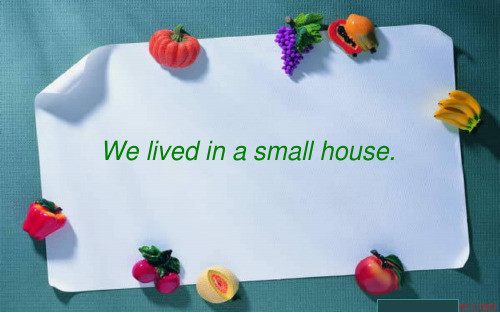
Dear_D_a_m_in_g_ ,
I _w_a_tc_h_ed a television programme about _C_h_in_a_last _n_ig_h_t _.An old lady t_a_lk_ed__ about her _l_if_e__ many years _a_g_o_. She c_o_o_ke_d_ on a _f_ire__.She _di_d_n’_t _have a television __o__ a radio. She _d_id_n_’t_ have at_el_e_ph_o_n_e. Shr e _w_o_rk_e_d in the _fi_el_d_s_.She c_o_u_ld_n_’t read _o_r__ write. I miss my _g_ra_n_d_m_o_th_e_r_ .I miss you ,too.
2 The old lady watches TV every day.( T )
3 There were many buses.
( F)
4 There weren’t any televisions. ( T )
5 The old lady lived in a small house. ( T )
We lived in a small house.
Sunday, October
Changing
3
11, 2020
Sunday, October
Changing
4
11, 2020
Sunday, October
(一年级起点)新版外研社小学英语五年级下册M5-M10知识点汇总

外研版(一起)第十册英语复习要点整理第一模块词汇:1、drive(过去式drove)驾驶2、flute笛子3、player演奏者4、office办公室5、factory(复数)factories6、shop商店7、hospital医院8、fish 捕鱼,钓鱼(动词)9、farm农场职业名称拓展:1、farmer农民2、postman邮递员3、doctor医生4、nurse护士5、firefighter / fireman消防员6、writer作家7、driver司机8、policeman警察短语:1、in the picture在照片上2、drive a bus驾驶公共汽车3、Chinese music中式音乐4、play the flute吹笛子5、teach English教英语6、work in an office在办公室工作7、work in a factory在工厂工作8、work in a shop在商店工作9、work in a hospital在医院工作10. work on a farm 在农场工作11. a flute / an erhu player 一位笛子(二胡)演奏者12、work at a school 在学校工作13、work at a bank在银行工作语法要点:本模块我们主要学习用一般现在时形式和一般过去时形式谈论某人的职业和具体工作。
要关注时间状语before/now,区分时态。
询问职业及职业中的细分类时要用特殊疑问词What .例:What did your father do ?What does your father do ?询问工作场所要用特殊疑问词Where例句:Where did your father work?Where does your father work ?主要句型:She was a driver before. 以前她是个司机。
五年级下册外研版英语第一模块单词

五年级下册外研版英语第一模块单词全文共10篇示例,供读者参考篇1Title: My First Module in Grade 5Hi everyone! I'm so excited to tell you all about the first module in my English textbook. It's super fun and I've learned so much already!In this module, we learned about different topics like family, pets, and hobbies. We also learned new words and phrases to help us talk about these things in English. My favorite part was when we learned about different types of pets like dogs, cats, and rabbits. I even got to talk about my own pet hamster, Fluffy!We also practiced speaking and listening in English. My teacher would ask us questions and we had to answer using full sentences. It was a bit tricky at first, but I got better with practice. We also listened to different conversations and stories in English. It was really cool to hear people speaking a different language!One of the most exciting things we did was a role play activity. We got into groups and acted out a conversationbetween a shopkeeper and a customer. I got to be the shopkeeper and it was so much fun pretending to sell things in English! I even got to use phrases like "How can I help you?" and "That will be 5 dollars, please."Overall, I had a great time learning English in this module. I can't wait to see what we'll learn next! English is such a fun and interesting language, and I'm so glad I get to study it in school. Bye for now, friends!篇2Hello everyone! I am so excited to share with you all about the first module of our English textbook, which is in the fifth grade! In this module, we will learn many new things and have lots of fun together.First of all, we will learn about animals in this module. We will learn about different types of animals, where they live, what they eat, and how they move. It will be so interesting to learn about animals from all around the world!Next, we will learn about food and drinks. We will learn how to talk about our favorite foods and drinks, as well as how to order them in a restaurant. I can't wait to learn some new words for all the delicious foods we will talk about!After that, we will learn about daily routines. We will learn how to talk about our daily activities, such as waking up, brushing our teeth, and going to school. It will be fun to learn how to talk about what we do every day!Lastly, we will learn about hobbies. We will learn how to talk about the things we like to do in our free time, such as playing sports, drawing, or reading books. I can't wait to share all of my favorite hobbies with my classmates!I am so excited to learn all of these new things in English class. I know it will be a lot of fun to learn and practice our English together. Let's work hard and have a great time in this module! Thank you for listening to my article. Goodbye!篇3Hello everyone! Today I want to share with you the first module of the fifth grade English textbook called "My New School" from the Foreign Language Teaching and Research Press.In this module, we learn a lot of new words and phrases to talk about our school life. We start off by introducing ourselves and talking about our friends and teachers. We also learn how todescribe our school, the subjects we study, and the different activities we do at school.One of my favorite parts of this module is learning how to talk about our daily routines. We talk about what time we get up, what we do in the morning, what time school starts, and what subjects we have in the morning and afternoon. We also learn how to talk about our hobbies and interests, like playing sports, reading books, or listening to music.Another fun activity in this module is learning how to talk about events and festivals. We learn about important holidays like Christmas, Halloween, and Easter, and how they are celebrated in different countries. We also learn how to talk about our own festivals and traditions.Overall, I really enjoyed studying this module because it helped me improve my English skills and learn more about school life in different parts of the world. I can't wait to continue learning and exploring more in the next modules of the textbook.That's all for now, see you next time!篇4Hello everyone! I want to share with you about the first module of our English textbook in the second semester of fifth grade.In this module, we learned a lot of new things like animals, food, daily routines, and hobbies. We also practiced speaking and writing sentences in English. It was so much fun!First, we learned about different animals like elephants, tigers, and monkeys. We learned how to describe them using adjectives like big, fast, and cute. We also learned about their habitats and what they like to eat. It was interesting to learn about all these amazing creatures!Next, we talked about food. We learned about different types of food like fruits, vegetables, and snacks. We also learned how to say "I like" and "I don't like" in English. It was fun to share our favorite foods with each other and practice our speaking skills.After that, we learned about daily routines. We talked about what we do in the morning, afternoon, and evening. We learned new words like wake up, brush teeth, and go to bed. It was helpful to learn how to talk about our daily activities in English.Finally, we talked about hobbies. We learned how to say what our hobbies are and why we like them. We also learned how to ask others about their hobbies. It was fun to share our interests with each other and practice our writing skills.Overall, this module was full of new and exciting things to learn. I enjoyed practicing my English speaking and writing skills with my classmates. I can't wait to learn more in the next module! Thank you for reading my article. Bye for now!篇5Hi everyone! Today I want to share with you some of the interesting things I learned in the first module of the fifth grade English textbook.In this module, we learned about different countries and their cultures. We learned about famous landmarks like the Eiffel Tower in France, the Great Wall of China, and the Statue of Liberty in the United States. It was so cool to learn about all these amazing places!We also learned about different traditional foods from around the world. We learned about sushi from Japan, pasta from Italy, and tacos from Mexico. It was so fun to learn about all the yummy foods people eat in different countries.Another thing we learned about was holidays and festivals. We learned about Christmas in the UK, Diwali in India, and Chinese New Year in China. It was so interesting to learn about how different cultures celebrate special occasions.One of my favorite parts of the module was learning about famous people from history. We learned about people like William Shakespeare, Marie Curie, and Nelson Mandela. It was so inspiring to learn about all the amazing things they did.Overall, I had a great time learning about different countries, cultures, foods, holidays, and people in this module. I can't wait to learn more in the next module! English class is so much fun!篇6Title: My Adventure in English ClassHi everyone! I'm Lily, a fifth-grade student at Sunshine Elementary School. Today, I want to share with you all about my adventure in English class. Our teacher, Miss Jenny, always makes learning English so much fun!In our first lesson, we learned about greetings and introductions. We practiced saying "Hello, my name is Lily" and "Nice to meet you" to each other. It was so cool to meet newfriends and learn how to greet them in English. Miss Jenny even had us do a role play where we pretended to meet someone for the first time. It was hilarious!Next, we learned about colors and numbers. Miss Jenny brought in balloons of different colors and asked us to name them in English. We had so much fun shouting out "red", "blue", "yellow" and more! Then, we played a game where we had to count how many balloons were in each color. It was a bit tricky, but we all worked together and figured it out in the end.After that, we moved on to learning about animals. Miss Jenny showed us pictures of all kinds of animals like lions, tigers, and elephants. We practiced saying their names in English and even learned some fun facts about each one. Did you know that elephants are the largest land animals in the world? It was so interesting to learn about them!One day, Miss Jenny surprised us with a special guest speaker who came to talk to us about his travels around the world. He told us all about the different countries he visited and even taught us how to say "hello" in different languages. It was so cool to learn about other cultures and see how English can connect people from all over the world.Throughout the module, we also had fun singing English songs, playing games, and doing group activities. Miss Jenny always makes sure we have a good time while learning English. I can't wait to see what she has in store for us in the next module!Well, that's all for now. I hope you enjoyed hearing about my adventure in English class. Learning English is so much fun, and I can't wait to continue improving my skills with Miss Jenny and my classmates. Bye for now!篇7Hello everyone, today I'm going to share with you some fun and interesting things from the first module of the fifth grade English textbook.In this module, we learned about different topics like animals, food, sports, family, and school. We learned new words, phrases, and grammar structures to help us communicate better in English.One of my favorite topics from this module is animals. We learned about different animals like lions, elephants, penguins, and dolphins. We also learned about their habitats, what they eat, and how they behave. It was so cool to learn about all these amazing animals!Another fun topic we studied was food. We learned about different types of food like fruits, vegetables, meat, and dairy products. We also learned how to talk about our favorite foods and describe the taste of different dishes. It was really fun to learn how to talk about food in English!We also learned about sports in this module. We learned about different sports like football, basketball, tennis, and swimming. We learned how to talk about sports we like, our favorite players, and our favorite teams. It was so exciting to learn about all these sports!In addition to animals, food, and sports, we also learned about family and school. We learned how to talk about our family members, describe their appearance and personality, and talk about our relationships with them. We also learned how to talk about our school subjects, teachers, classmates, and activities. It was great to be able to talk about our family and school life in English!Overall, I had a lot of fun learning new things in this module.I can't wait to continue learning more in the next module!篇8Hello everyone!Today, I want to share with you all about the first module in our English textbook for the fifth grade. It's called "Welcome to our world". In this module, we learned a lot of cool things about different countries and their cultures. We also learned some new words and phrases to help us talk about our own culture and traditions.One of the things we learned about was the Chinese New Year. We found out that it's a very important festival in China, and people celebrate it with lots of delicious food and colorful decorations. We also learned some new words like "lantern" and "dragon" to describe the festivities.Another country we learned about was India. We learned about the beautiful saris that Indian women wear, and the delicious food like curry and naan bread that they eat. We also learned some new words like "sari" and "spices" to describe Indian culture.In this module, we also practiced asking and answering questions about different countries. We learned how to ask questions like "What do you do in your country?" and "What do you eat?" We also learned how to answer those questions using new words and phrases we learned in the module.Overall, I had a lot of fun learning about different cultures in this module. I can't wait to learn more in the next module! Thanks for reading my article, and I hope you learned something new too. Bye for now!篇9Hello everyone! Today I want to share with you the first module of the fifth grade English book "New Senior English for Junior Students".In this module, we learn a lot of interesting things such as introducing ourselves, talking about our hobbies, describing our family members, and even discussing our daily routines. We also learn new words, phrases, and grammar rules to help us improve our English skills.My favorite part of this module is when we get to practice speaking in English with our classmates. It's so much fun to learn together and help each other improve. I especially like practicing how to introduce myself and ask others about their hobbies or favorite things.Another fun activity we did in this module was to write a short paragraph about our family members. It was exciting to talk about our parents, siblings, and pets in English. It's a greatway to practice our writing skills and learn new vocabulary at the same time.Overall, I really enjoyed learning from this module. It's been a great opportunity to improve my English skills and have fun at the same time. I can't wait to continue learning more in the next modules. English is so much fun! See you next time!篇10Hello everyone, I'm here to tell you all about the first module in our English textbook for the fifth grade. This module is super cool and fun, so let's dive right in!In this module, we are learning all about different countries and cultures around the world. We get to learn about their languages, traditions, food, and so much more. It's really exciting to learn about places that are far away from us and see how people live in different parts of the world.One of the countries we are learning about is China. We learned about the Great Wall of China, which is a really long wall that was built a long time ago to keep out invaders. It's so amazing to think about how people were able to build such a huge wall without modern tools like we have today.We also learned about Chinese New Year, which is a very important holiday in China. People celebrate with dragon dances, fireworks, and lots of yummy food. It sounds like so much fun, and I wish I could celebrate Chinese New Year too!Another country we learned about is Italy. We learned about famous landmarks like the Leaning Tower of Pisa and the Colosseum. Italy is also famous for its delicious pasta and pizza. I really want to try some authentic Italian food someday!I love learning about different countries and cultures in this module. It's so cool to see how diverse our world is and how much there is to explore. I can't wait to learn more about other countries in the next modules!That's all for now, but I hope you enjoyed hearing about what we're learning in our English class. Thanks for reading, and see you next time!。
外研版英语五年级下册课文

Module1 Unit 1 She was a driver before1.Listen and chant .My father is a doctor .His name is Drew.He loves me very much .I love him , too .My mother is a driver .Her name is Sue.She loves me very much .And I love her , too .2.Listen , read and act out .Lingling : Look ! This is my grandma . She was young in this picture .Lingling :She was a driver before .Sam :What did she drive ?Lingling:She drove the bus .Amy: Who’s this ?Lingling :It is my grandma . He was a flute player before .Sam : What music did he play ?Lingling :He played Chinese music .Lingling : I can play the flute , too .Amy and Sam :Oh,no ! You can’t !Module 1 Unit 2 He worked in an office1.Look , listen and say .That is my grandpa. He is fishing . He was a train driver before . He’s got a train !2.Listen and read .Look at the picture . This is my family .This is my grandpa . He worked in an office . This is my grandma . She worked in a factory .This is my father . He works in a hospital . This is my mother . She works in a shop .And this is me . We are a happy family.Module 2 Unit 1 What did she have for lunch?1.Listen and chant .What did you have for dinner ?Bread , meat and vegetables.What did you have for dinner ?Fish , eggs and vegetables .2.Listen , read and act out .Daming : Look . I have got an email from Lingling . It’s about English food .Fan fan: What does it say ?Daming : Yesterday she had an English breakfast .Fanfan: What did she have ?Daming : She had eggs and sausages .Fanfan: And what did she have for lunch ?Daming : She had eggs and sausages .Fanfan : And what did she have for lunch ?Daming : She had sandwiches .Fanfan : What did she have for dinner ?Daming: She had fish and chips .Fanfan: Fish and chips ?Daming : Yes . It’s a traditional English dish .Fanfan: Does Lingling like English food ?Daming : Yes , she does . She says it’s delicious !Module 2 Unit 2 Lunch is usually at half past twelve1.Look , listen and say .Daming usually has meat , vegetables and rice for dinner . But today he has noodles an egg .It’s my birthday today. Wait, who are you?2.Listen and read .In the UK , people usually have breakfast at 7 o’clock . Lunch is usually at half past twelve . Dinneris usually at half past six .Sundays are special in the UK . Families usually eat lunch together. They eat chicken, potatoes and other vegetables.Module 3 Unit 1 Have you got the Harry Potter DVDs1.Listen and chant .I am Mr Hook .Here is my book .It’s a present for you ,Please take a look .2.Listen , read and act out .Amy : Excuse me. Have you got the Harry Potter DVDs?librarian : I will look on the computer . Sorry, we haven’t got the DVD s. But we have got the books.Amy : Oh, good . Where are they ?Librarian : I will show them to you .Lingling : Aah . You’ve got lots of Harry Potter books here !Librarian : Yes , we have .Amy : Harry Potter is our favourite .Lingling : Children in China like Harry Potter , too.Librarian : Your library card , please .Amy: Here you are .Librarian : Please give the books back in two weeks .Amy and Lingling : We will . Thank youModule 3 Unit 2 You can use the computers1.Look , listen and say .This is our library .You can borrow books from here .This is our library . All our books are here .2.Listen and read .You can do lots of things in libraries . You can borrow books , CDS and DVDs . You can use thecomputers . You can do your homework . But you can’t talk to your friends .Module 4 Unit 1 Did you read them ?1.Listen and chant .I sent you a bike .I sent you a kite .Did you ride the bike ?Did you fly the kite ?2.Listen , read and act out .Daming’s grandma lives in the US.Daming : Nihao!Grandma : Daming , it’s Granma !Daming : Hello , Grandma . How are you?Grandma : I am fine , thanks . Daming , I sent you a maths game . Did you get it ?Daming : Yes , Grandma . Thank you .Grandma: And I sent you American chocolate . Did you eat it ?Daming : Yes , I ate some of it . Thank you. It was delicious .Grandma : And I sent you English books . Did you read them ?Daming : Yes , Grandma . I read them . They are interesting .Grandma : Good . Do you want to come to the US this summer ?Daming : Yes , Grandma . Oh, Mimi is eating my chocolate !Module 4 Unit 2 My favourite season is spring1.Listen and chant .I can go swimming in summer .I love swimming with my mother .I can go skiing in winter .I love skiing with my father .2.Listen and read .What’s your favourtie season ?My favourite season is spring . It’s warm . There are flowers on the trees . I can see ducks in the river .I love summer . It is hot . I can go swimming . I can wear shorts .I love autumn . It’s cool . The leaves fall from the trees . I can play with them .I love winter . It’s cold . I can play with the snow . I can wear gloves .Module 5 Unit 1 Your bag is broken1. Look , listen and say .How much is that bag ? It’s only thirty yuan .It’s vey cheap.But it looks dirty .2. Listen , read and act out .Ms Smart:Lingling , your bag is broken ! You can’t take it to China . I will buy you a new one .Lingling :Thank you .Lingling :This black bag is nice . It’s big .Ms Smart :But it’s very heavy . Look at this green one . It’s light .Lingling :But it’s very small, Ms Smart . I really like the black one .Sales assistant :This red bag has got wheels . It will be easy for her to carry.Ms Smart:How much is it ?Sales assistant :It’s 30 pounds .Ms Smart :Great! We will take it , please .Lingling:Thank you very much .Unit 2 Mine is pink1.Look , listen and say.Can you carry my bag on your back ?I can carry you and your bag with my hands .2.Listen and read .My schoolbag is red and blue . I carry it on my back .Mine is pink . I carry it over my shoulder .Mine is brown.I carry it with my hand .Mine is broken . I can’t carry it .Module 6 Unit 1 We will see lots of very big stones1.Listen and chant .How old is the Great Wall ?And what did they build it for ?We will visit it tomorrow .You’ll find the things you want to know .2.Listen , read and act out .Amy : On Saturday , we are going to see Stonehenge .Lingling : What’s that ?Amy : It is a very old place . It’s about five thousand years old .Lingling : That’s very old ! Wh at will we see there ?Amy : We will see lots of very big stones . They are in a circle . Some stones are on top of the others .Lingling : It’s very interesting . Why did people build it ?Amy : No one knows .Amy : You’re clever . Maybe you wil l find the answer !Lingling : I hope so !Lingling : How will we get there ?Amy : By car . It will take three hours .Lingling : Well , I can’t wait !Module 6 Unit 2 It was amazing1.Look , listen and say .Daming , come and take a bike ride .No , I am tired .Then come and take a bus ride .All right !2.Listen and read .Dear Daming,Last Saturday , we went to Stonehenge . There was a very big surprise waiting for me . We took a short helicopter ride over Stonehenge !The Stones are very big , but they looked small from the sky . It was amazing . I took some nice photos there .What will you do this summer ?LoveLinglingModule 7 Unit 1 My father goes to work at 8 o’cl ock every morning1.Look , listen and say .I go to school at 7 am . My cousin goes to work at 7 pm .I go home at 5 pm . He goes home at 5 am .2.Listen , read and act out .Daming : My father goes to work at 8 o’clock every morning .Fangfang: What does he do ?Daming : He is a policeman .Fangfang : My father goes to work at 6 o’clock every evening .Daming : That’s late . What does he do ?Fangfang : He is an actor . He is very busy .Daming : My mother goes to work at 11 o’clock every night .Fangfang: That’s very , very late . What does she do ?Daming : She is a nurse .Fangfang : My mother goes to work at half past five every morning .Daming : That’s very early . What does she do ?Fangfang : She’s a taxi driver .Fangfang: Look ! Here is my mother !Fangfang’s mother : Hello , children . I will take you to school .Daming and Fangfang: Thank you !Module 7 Unit 2 I will be home at 7 o’clock1.Look , listen and say .Oh no ! It’s a quarter to eight now . School starts at 8 o’clock . I will be late .It’s half past eight now . I am late and I am tired .2.Listen and read .Sam : Dad , it’s 6 o’clock now . What time will you be home ?Mr. Smart : I will be home at 7 o’clock .Amy : It’s half past six now . Will you still be home, Dad ?Mr Smart : Yes , I will .Ms Smart : It’s a quarter to seven . Are you going to be late ?Mr Smart : Don’t worry ! I will be home at 7 o’clock . Why ?Amy : It’s 7 o’clock . Here he is .All: Happy birthday !Mr Smart : Thank you !Module 8 Unit 1 Will you help me ?1.Look , listen and sayTomorrow is my cat’s birthday .I will make a paper fish for her .It will be a great present .2.Listen , read and act out .Daming :I am going to visit my cousin in New York. His name is Simon . What present can I take ?Fangfang:What about chopsticks ?Daming :I think he’s got some chopsticks . His mother is Chinese .Fangfang: What about a kite ?Daming :Good idea!I will make a kite !Fangfang: But will it be windy in New York?Daming : I think so .Daming : Will you help me ?Fangfang : Of course I will .Fangfang :Daming , your cousin will love this kite . It is a Chinese dragon .Daming : Thank you for your help . It will be a great present .Module 8 Unit 2 I made a kite1.Listen and chant .I drew a dragon .I cut the paper .I made a kite for my sister .2.Listen and read .I Made a KiteI drew a dragon on a piece of yellow paper .I painted it .I cut the paper with scissors .I put sticks on it .I tied strings to it .Then I could fly my kite .Module 9 Unit 1 We laughed a lot1.Look , listen and say .I saw a dog . It wore a coat .I saw a dog . It wore a hat .I saw a man . He wore a skirt .2.Listen and read .Daming : Wow! I’ve got two letters in English ! One is from the UK and one is from the US.15 Marling StreetLondon NW2UKDear Daming :Last week , we went to a children’s theatre . The men wore women’s clothes . The women wore men’s clothes . The actors told lots of jokes . It was very funny . We laughed a lot . Children here love the theatre .After the show , we went to a restaurant . We all ate hamburgers and chips .Are you ready for your trip to the US ?Love ,LinglingModule 9 Unit 21.Listen and chant .He borrowed some books . And he read them all .He bought many books .But he didn’t read at all .2.Listen and read .Dear Daming ,How are you ? We are getting ready for your visit . Dad put another bed in my room . Mum bought new chopsticks for you . And we borrowed a bike for you.Dad read a book about Chinese history . He is going to ask you some questions ! Me too! History is my favourite subject .We’ll visit a lot of places together . It will be fun !See you soon !Love , Simon .Module 10 Unit 1 What did you put in your bag ?1.Look , listen and say .Ms Smart : Where are you going this weekend , Sam ?Sam : I don’t know .Mr Smart : When are you going to get up ?Sam : I don’t know .Sam : Mum , what did you say to me ?Ms Smart : I don’t know !2.Listen , read and act out .Grandma : Hello , Daming .Daming : Hello , Grandma .Grandma : Are you ready for your trip tomorrow ?Daming : I don’t know , Grandma .Grandma : What did you put in your bag ?Daming : My clothes , my shoes , some presents , my ticket and my passport .Grandma : And where will you go tomorrow ?Daming : I will go to the airport . Then I will take the plane to the US .Grandma : When will you leave tomorrow ?Daming : At 7 o’clock in the morning .Grandma : Who is going to the airport with you ?Daming : Who ? Mum !Grandma : Great ! You are ready for your trip ! See you in the US , Daming !Daming : OK. Bye , Grandma !Module 10 Unit 2 I played on the beach1.Look , listen and say .Last night , I went to the moon . I took some photos for you .Look ! What’s in the photo?Oh, it’s our city !2.Listen and read .I am Hannah . Last summer , I went to Brighton . I went there in July . I played on the beach . I ate fishand chips . I made a new friend there . Her name is Daisy. I often write to her .I am Wang Fei . Last summer , I went to Mount Tai . I went there in August .I climbed the mountain andhad a picnic . I met my classmates there . We had a really good time together .。
外研版(三起)(2012)小学英语五年级下册Module 1 Unit 2 She didn't have a television.Module 1 Unit 2

精品PPT
Read and answer.
• What did Lingling do last night?
She watched a television programme about China.
2. What did the old lady talk about?
She talked her life many years ago.
a, watched, about, I,programme, TV, China. I watched a TV programme about China. cooked, She, a , fire, on. She cooked on a fire.
精品PPT
连词成句。
didn’t, a , a, She, radio, have, television, or She didn’t have a television or a radio.
Listen and say.
精品PPT
Words .
night
work in the field
work
精品PPT
fire
Words .
radio
telephone
write
精品PPT
现在
过去
watch------------watched
talk--------------- talked cook ------------- cooked can’t --------------- couldn’t
years ago. Now many people __h_a_v___(have)
ones.
e
3. Many years ago he l_iv_e_d__(live) in a small
外研版三起小学英语五年级下册电子课本

外研版三起小学英语五年级下册电子课本Module 1 ChangingUnit 1 We lived in a small house.学习目标:1. 掌握单词: life, different, ago, any, television, us,grandchildren, lady.2. 灵活运用句型: There weren’t any buses. We lived in a small house.There are lots of buses and cars. We live in a big house.教具: 单词卡片,教学挂图,录音机教学程序:一.板题示标T: Today we are going to learn Module 1 Unit 1 《We lived in a small house》 . First , let’s look at the learning aims.二.课前热身Talking about: holiday and changing of you.三.课文呈现与导入T: In the winter holiday, you had a lot of changes. Now you are older and cleverer .I am very glad to see your changes.( And write ‘changing’ on the blackboard. Tell students‘Everything is changing. No change, no progresses.)四.课文教学1. 拿一些老照片给学生看并说: Look, life was very different many years ago .But how was itdifferent? Today, we will learn how to pare past and present life.2. 对话学习(1) 学生听第一遍录音,找也不认识的单词.Listen to the tape and underline the new words.(2) 学生听第二遍录音,跟读自己不认识的单词.Listen to the tape-recorder and read follow it .(3) 学生听第三遍录音的同时,T把一些新单词写在黑板上,领读学生掌握不好的词.示例:life, different, ago, any, television, grandmother, grandfather(4) 听第四遍录音,学生跟读.要求:边听边指,注意模仿语音语调.(5) 学生四人一组练习对话,五分钟后,看哪组同学的对话读得最流利.3. 学生活动.T准备一些图片或实物,学生练习描述.并分组比赛哪个组回答的快.例:一棵大树,一棵小树.There is a big tree, there is a small tree.They are different.一个空盒子,一个装了很多纸的盒子.There aren’t any papers. There are lots of papers.五、总结及做作业1. SummaryT: Today we have learnt “How to describe past and present life, review simple past tense and present tense.”2. Today’s homeworka. Listen and read Unit1 three times, try to recite and act.b. Compare two photos and write differences.Module 1 ChangingUnit 2 She didn’t have a television.学习目标:1. 掌握单词: fire, radio, telephone, field, hope.2. 灵活运用句型: She worked in the fields. She didn’t havea television.3. 学习写信的格式4. 了解字母组合ai, ay, al, au, ar, 在单词中常见的读音.教具: 单词卡片,教学挂图,录音机教学程序:一.板题示标T: Today we are going to learn Module 1 Unit 2 《She didn’t have a television.》First ,let’s look at the learning aims.二.课文导入Yesterday, Lingling saw the programme about China, she missed her grandmother very much.三.课文教学1. 文章学习(1)学生听第一遍录音,找出不认识的单词.Listen to the tape and underline the new words.(2)学生听第二遍录音,跟读自己不认识的单词.Listen to the tape-recorder and read follow it .(3)学生听第三遍录音思考以下问题.a. What programme did Lingling watch last night?b. What was the old lady’s life like many years ago?c. Who does Lingling miss?(4)听第四遍录音后学生讨论上述问题,并派选手参加每个问题的抢答.在抢答的同时,T把一些生单词写在黑板上,领读学生掌握不好的词.(10分钟后看看哪个小组最棒,T给获胜的小组加分).(5)听第五遍录音,学生跟读.要求:边听边指,注意模仿语音语调. 2.学生活动So she writes a letter for Daming and tells about that programme and her feeling.(1)活动1拿出单词卡Television, radio, telephone, 让学生用She didn’t have/He didn’t have/we didn’t have 造句子.(1)做游戏Put nine cards on the desk. Two students use cards to make dialogue.For example:A: Where was he/she seven days ago?B: He/She was ?A: What did he/she do there?B: He/She ?四. 语音学习1.T播放SB Unit 2 活动1的录音磁带,全班同学听并跟读.2.学生一边听一边划线,一边说单词.3.T把单词rain, play, all, autumn, star, party, warm, quarter贴到黑板上,一边贴,学生一边读.4.学生跟据读音,找也发音规律,然后要求学生把这些单词照读音分组.五.学唱歌1.放第一遍录音,学生认真听.2.放第二遍录音,每句一停,让学生重复.3.边听边唱.Module 2 GrandparentsUnit 1 She learnt English.学习目标:1. 掌握单词: learnt these dancer2. 灵活运用句型: She learnt English.Did she learn any foreign languages?He is learning English now.3.了解字母组合ai, ay, al, au, ar, 在单词中常见的读音.教具:单词卡片,教学挂图,录音机教学程序:一.板题示标T: Today we are going to learn Module 2 Unit 1《She learnt English》. First , let’s look at the learning aims.二.热身复习用上节课学的句子She didn’t have ?照句.三.课文教学1. 文章学习(1)学生听第一遍录音,找出不认识的单词.Listen to the tape and underline the new words.(2)学生听第二遍录音,跟读自己不认识的单词.Listen to the tape-recorder and read follow it .(3) 听第四遍录音,学生跟读.要求:边听边指,注意模仿语音语调 2.学生活动(1)活动1让学生三人一组,分别扮演对话中的Linging , Amy和Sam.检测:请学生将对话演出来,表演时可以离开座位自由对话,最后请自愿者在全班同学面前表演.(10分钟后,比比看哪个小组表演的最棒)(2)活动2问题/回答Did you/he /she ?..? Yes, I/she/he did. No, didn’t.He is doing ??.Have Ss look it , give some minutes to practise in pairs ,then act it out.Module 2 GrandparentsUnit 2 Mr Li was a teacher.学习目标:1. 掌握单词: study hard retired2. 灵活运用句型: Mr Li was a teacher. He taught Chinese.Chen Hai is an English teacher. He’s teaching Mr Li.3.了解字母组合aw, air,ass 在单词中常见的读音.教具:单词卡片,教学挂图,录音机教学程序:一.板题示标T: Today we are going to learn Module 2Unit 1 , first ,let’s look at the learning aims.二.热身复习与课堂导入1.复习上节课学过的单词和句子老师问:Did you learn English?学生回答:Yes, I did.2.老师让一名学生站在讲台的前面说以下:T: Ten years ago, I was a student . Now, I am a teacher. Ok, let’s e to the text.三.课文教学1. 学生活动让学生自己先读一遍课文,划出不认识的生词.出示单词卡,老师重点讲解生词.带同学重复读生词.播放录音,学生听并跟读课文.同桌相互朗读.2.分组练习二人一组,分别扮演书中的老师和学生,用第一人称I进行描述.例:Ten years ago, I was a teacher, I taught Chinese. Now, I am retired. I am learning English. Ten years ago, I was a student, I studied very hard. Now, I am an English teacher.3.身体语言请两位同学到讲台前做读书,写字,跳舞的动作,老师问What did he/she do? 学生回答He/she read a book/danced/written.请两位同学上来台上,一人作,一人说。
外研版小学五年级英语下册教学课件 Module1 Unit1

点我看解析
点我看解析
We live in a big house.
There are lots of buses and cars.
Life was very different in China many
years ago.
change
1973年
2020年
Unit 1 We lived in a small house.
Module 1 Unit 1 We lived in a small house.
外研版 五年级 下册
am \ is
wasபைடு நூலகம்
there was
are are
were
there were
am not \ isn't wasn't
there wasn't
aren't aren't weren't
there weren't
点我看解析
Unit 1 We lived in a small house.
Part 1 Presentation
[ˈprəʊɡræm]电视或广播节目
Look! It’s a programme about China.
old lady
[ˈleɪdi] 女士,夫人
interviewer
[ˈɪntəvjuːə(r)]采访者
There was \wasn't... many years ago. There were \weren't ... many years ago.
We lived in a small house.
There weren'tany televisions/'telɪvɪʒn/ 电视机
外研版五年级下英语第一模块

Module 1 Changing设计人:红河镇中心小学张海凤一、单元教材分析本模块的主要是以谈论人们过去和现在的生活变化。
Unit1的课文主要是描述了Amy和Lingling通过看电视了解到中国正在变化。
玲玲想念中国和奶奶了。
通过学习,要让学生了解到谈过去的情况要用过去时,谈论现在的情况要用现在时。
Unit2的课文是讲玲玲写了一封信给大明。
她告诉大明自己和Amy看到的电视节目的内容。
重在运用一般过去时,学会描绘别人过去做过和发生的事情。
语音方面主要了解字母ai, ay;al,au;ar在单词中的常见读音,让学生在朗读单词的过程中体会字母组合的发音。
二、单元总体目标1.复习巩固过去时,会运用过去时描述过去发生的事情。
2.熟练运用一般现在时,学会描述现在发生的事。
3.掌握字母组合ai,ay,al,au,ar在单词中的常规发音。
4.了解英语书信格式,并能对其进行运用。
三、单元重点、难点重点:(1)词汇:life,different,ago,any,television,grandchildren,us, grandmother,lady, fire, radio,telephone, field, hope.(2)语句:She didn’t have a television.She worked in the fields.There were/weren’t …There are …We lived … many years ago.We live… now.难点:用过去时态和现在时态描述过去和现在的生活。
四、突破措施1.任务型教学法。
通过设置各种形式的任务活动,让学生通过自主合作学习掌握学习的内容。
2.充分利用学生想要展现假期生活的心理,引导学生进入话题,让学生通过写一写,说一说简化学习的重难点。
Module1 Unit1 We lived in a small house. 导学案一、导学目标:知识目标:能听说,认读本单元课文内容。
外研版小学英语(三起)五年级下册单词表(含音标)

外研版小学英语(三起)五年级下册单词表Module 1still /st?l/还,仍然programme /’pr??gr?m/(电视或广播)节目lady /’leidi/女士,夫人life /la?f/生活different /’d?fr?nt/不同的ago /?’g??/以前interviewer /,?nt?’vj u:?/采访者enough /?’n ?f/足够的television /,tel?’v???n/电视机*grandchildren(grandchild的复数形式)(外)孙子(女)/gr?n’ t??ldr?n/change /t??nd?/改变,变化night /na?t/夜晚,夜间work /w?:k/工作;劳动;干活儿field /f i:ld/田地fire /fa??/火,炉火or /?: /(用于否定句中)也不,也没radio /’r e?d ???/收音机telephone /’tel?f??n/电话couldn`t=could not /k?ndt/不能write /ra?t/写hope /h??p/希望Module2learnt(learn的过去式)/l?:nt/学习taught(teach的过去式)/t ?:t/教,讲授language /’l??gw?d?/语言wrote(write) /r??t/写dancer /’dɑ:ns?/舞蹈演员foreign /’f?:r?n/外国的studied(study的过去式) /’st?di/学习hard /hɑ:d/努力地Module3hamburger /’h?mb?g?/汉堡English /’??gl??/英国(式)的breakfast /’brekf?st/早餐,早饭lunch /l ?nt?/午餐,午饭sandwich /’s?ndw?t?/三明治fish and chips/f??t??ps/炸鱼加炸薯条traditional /tr?’d???n?l/传统的dish /d??/食品;菜肴very much很,非常gave/ge?v/给(give的过去式)tonight /t?’na?t/今夜,今晚Module4librar y /’la?br?ri/图书馆student /’stjU:d?nt/学生sent(send的过去式) /sent/发送,寄*CD激光唱片,光盘idea /a?’d??/主意,想法put /put/放,安放*shelf / ?elf/架子heavy /’hevi/重的,沉的dictionary /’d?k ??n?ri/词典;字典card /kɑ:d/卡片library card图书卡,借书证ask /ɑ:sk/邀请wrong /r??/错误的dear /d??/哎呀information /, ?nf?’me???n/信息*e-book电子书project /’pr?d?ekt/项目guide /ga?d/介绍,指南,手册film /f ?lm/电影as well /?s wel/又,还,也way /we?/方法,方式on关于*topic /’t?p?k/话题Module5light /la?t/轻的hard /hɑ:d/困难的,费力的*broken /’br??k?n/坏的,破的department store /d ?’pɑ:tm?ntst?:/百货商店pocket /’p?k?t/口袋,兜umbrella / ?m’brel?/雨伞sales assistant /se?lz ?’s?st?nt/售货员,营业员wheel /wi:l/轮子easy/ i:zi/容易的,不费力的take /te?k/选择要,选择购买too /t u:/太,过于try /tra?/试,尝试lovely /’l?vli/美丽的,可爱的;令人愉快的Module6moon /m u:n/月亮,月球get /get/到达west /west/西,西部,西方;向西方parent /pe?r?nt/母亲;父亲;家长stay /ste?/停留play day sayJuly /d??’la?/七月south /sa?θ/南,南部,南方;向南方remember /r?’memb?/记得June / d?u:n/六月east / i:st/东,东部,东方;向东方best /best/最好的north /n ?:θ/北,北部,北方;向北方rest /rest/ 休息have a rest休息一下rode /r??d/骑(ride的过去式)Module7evening / ‘?v?n??/傍晚,晚上late/l e?t/近日暮的;近深夜的;时间不早的worker /’w?:k?/工人factory /’f ?kt?ri/制造厂;工厂early /’ ?:li/早的taxi /’t?ks?/出租车,计程车quarter /’kw?:t?/一刻钟to /t u:/(距整点)差......worry /’w?ri/焦虑,担心Module8paper /’pe?p?/纸Chinese / t?a?’n i:z/中国人的so /s??/如此,这样word /w ?:d/词,字drew(draw的过去式) /dr u:/画cut(cut的过去式) /k ?t/剪,切,割piece /pi:s/张,片,块paint(用颜料)/pe?nt/绘画,着色put(put的过去式) /p ? t放,安放stick /st?k/小木棍,小木条tied(tie的过去式)/ta?d/扎上,系上*string /str??/线,绳子Module9laugh /lɑ:f/笑wore(wear的过去式) /w ?:/穿letter /’let?/信,书信theatre /’θ??t?/剧院women(woman的复数形式)/’w?m?n/女性,妇女actor /’?kt?/演员told(tell的过去式) /t??ld/口述,讲(故事等)joke / d???k/笑话after /’ɑ:ft?/在……以后show(尤指剧院的) / ???/演出,表演restaurant /’rest?r?nt/饭店,餐馆read(read的过去式) /red/读at all一点都in在(将来一段时间)之后another /?n’?e?/另一个history /’h?st?ri/历史ask /ɑ:sk/问,询问question /’kwest??n/问题forget /f?’get/忘,忘记bring /br??/带来,拿来soon /s u:n/不久,很快Module10when /wen/在什么时候end /end/结束,终止nervous /’ n?:v?s/紧张的,情绪不安的all right没事,没问题airport /’ e?p?:t/机场ticket /’t?k?t/票passport /’pɑ:sp?:t/护照safe /se?f/安全的,平安的pet /pet/宠物speak/spi:k/说,讲building /’b?ld??/建筑物American/ ?’mer?k?n/美国的;美国人的;美国人find out /fa?nd a?t/发现,弄清more /m?:/更多的(量),较多的(量)。
小学新标准英语外研版五年级下册第一模块第一单元.ppt

many years ago
now
Life is
2020年2月22日
1
• 听活动二,找出体现过去和 现在生活变化的句子。
How was it different?
We lived in a small house. We didn’t have enough food. There weren’t any buses. There weren’t any televisions.
• There was a small treenear the house. • There is a__b_i_g_t_r_e_e near the house.
I had a small dog. Its name was Bobby. I have t_h_re_e__d_o_g_s now. Bobby is _b_i_g__now.
We lived in a small house.
We live in a big house.
live ---------- lived
Saturday, February 22,
7
2020
Many years ago 许多年前
We didn’t have enough food.
We’ve got lots of food.
• There weren’t any televisions.
2020年2月22日
14
Now We watch TV every day.
There is 现在有一个 例如:There is a tree.
There was 过去有一个 例如: There was a tree.
- 1、下载文档前请自行甄别文档内容的完整性,平台不提供额外的编辑、内容补充、找答案等附加服务。
- 2、"仅部分预览"的文档,不可在线预览部分如存在完整性等问题,可反馈申请退款(可完整预览的文档不适用该条件!)。
- 3、如文档侵犯您的权益,请联系客服反馈,我们会尽快为您处理(人工客服工作时间:9:00-18:30)。
grandmother
grandchildren
精选
语watch------------watched 观看
法talk--------------talked 交谈
重 点
cook------------cooked
don’t-----------didn’t
烹饪 不
work-----------worked 工作
.
精选
Now, We live in . We have got . There are .
精选
ran fast sees badly
cooked badly
is o精选ld
语 We lived …many years ago. 法 There weren’t…. 重 由ago代表的过去时态, 点 动词要使用过去式。
阳光飞扬考前培训 五年级
精选
Module 1 Unit 1
We lived in a small house!
Unit 2
She didn’t have a television.
精选
many years ago
1973年
2015年
change
now
精选
Many years ago, there weren’t any buses and cars.
Now he lives in a big house. There is a big tree. He has three dogs no精选w. Its is big now.
Many years ago
She cooked on a fire. 精选
Many years ago
She worked in the fields. 精选
can’t-----------couldn’t 不能
动词原形
动词过去式
精选
grandmother grandchildren
精选
different
精选
Look and say
×
Many years ago,
there weren’t any computers .
we lived in a small house
精选
Many years ago, there weren’t any televisions.
television
精选
精选
There was a small house four years ago. He lived in it. He had a small dog. There was a small tree.
Now he lives in a big house .
随
There is a big tree.
时
He has three dogs
应
精选
变
精选
We live in …now. There is/are….
由now代表的一般现在时态, 动词使用原形。
精选
He lived in a small house four years ago. There was a small tree. He had a small dog. Its name was Bobo.
television radio telephone
She didn’t have a …… many years ago.
精选
life
生活
any
任何
us
我们
talking to 与某人交谈
enough 足够的
精选
词
汇 重
life
different
点 any television
us ago lady
